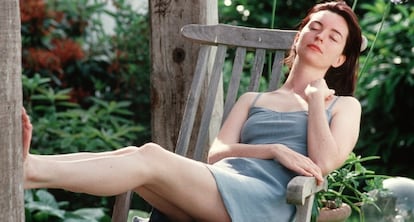The Spanish siesta: myth or reality?
Timetables are different to the rest of Europe¡¯s, but that doesn¡¯t mean people are sleeping on the job

On Tuesday, The Washington Post reported that Spain¡¯s prime minister ¡°wants to end the siesta.¡±
The US daily was referring to Mariano Rajoy¡¯s proposal to return the country to GMT, the same time zone as its western European neighbors Portugal and Britain, which makes geographical sense. He also said he wanted to encourage employers to end the working day at 6pm, rather than the usual 8pm or later.
In short, Rajoy¡¯s goal is to bring Spanish timetables in line with the rest of Europe¡¯s. According to The Washington Post, this would mean ending ¡°a long-standing and well-recognized tradition [¡] siestas, the sleep-filled breaks some Spaniards take.¡±
This is not the first time the English-speaking media has reported on Spain¡¯s supposed penchant for an afternoon nap. In 2013 UK newspaper The Daily Telegraph criticized Spain¡¯s poor timekeeping and late nights, and a year later, The New York Times quoted an official from Spain¡¯s National Statistics Institute who rebuffed the claim, insisting that ¡°those three-hour siestas simply do not exist.¡±
The soporific truth
While it¡¯s largely true Spain¡¯s midday break is longer than in other countries, sometimes lasting up to two hours, that doesn¡¯t mean Spaniards use it to snooze.
Research is patchy, but in 2009 a foundation attached to the San Carlos Clinical Hospital (Fundadeps) and the Spanish Bed Manufacturers Association (Asocama) conducted a joint survey among 3,000 adults that yielded the following results:
- 16.2% of Spaniards take a nap every day.
- 22% take occasional naps.
- 3.2% only nap on weekends.
- 58.6% never nap at all.
The data also showed that the residents of southern Murcia took the most daily naps (21.2% of them) while Basques, from the north of the country took the fewest (12.2%).
Compare this to a 1998 survey reported on by EL PA?S, which showed that 23.8% of Spaniards were getting some afternoon shuteye at the time.
Sign up for our newsletter!
The EL PA?S English Edition is launching a weekly newsletter. Sign up today to receive a selection of our best stories in your inbox every Saturday morning. For full details about how to subscribe, click here.
American nappers
To put the figures in perspective, let¡¯s compare with the United States. A survey by the Pew Research Institute published in 2009 revealed that on any given day, 34% of Americans take a nap ¨C whether post lunch or at any other time. What¡¯s more, Hispanics ranked an average 33%.
Then there is the question of whether the siesta is good for you. The answer appears to be yes. According to Scientific American, ¡°daytime napping in healthy adults does indeed lead to benefits in terms of alertness, mood and cognitive functioning.¡±
The experts say twenty-minute naps are best, as one hour or more of sleep puts us in a deep slumber that will not make us feel as refreshed when we wake up.
According to the 2009 Spanish study, Spaniards who do take a siesta sleep for an average of just over an hour, although a third doze for around 35 minutes.
English version by Susana Urra.
Tu suscripci¨®n se est¨¢ usando en otro dispositivo
?Quieres a?adir otro usuario a tu suscripci¨®n?
Si contin¨²as leyendo en este dispositivo, no se podr¨¢ leer en el otro.
FlechaTu suscripci¨®n se est¨¢ usando en otro dispositivo y solo puedes acceder a EL PA?S desde un dispositivo a la vez.
Si quieres compartir tu cuenta, cambia tu suscripci¨®n a la modalidad Premium, as¨ª podr¨¢s a?adir otro usuario. Cada uno acceder¨¢ con su propia cuenta de email, lo que os permitir¨¢ personalizar vuestra experiencia en EL PA?S.
?Tienes una suscripci¨®n de empresa? Accede aqu¨ª para contratar m¨¢s cuentas.
En el caso de no saber qui¨¦n est¨¢ usando tu cuenta, te recomendamos cambiar tu contrase?a aqu¨ª.
Si decides continuar compartiendo tu cuenta, este mensaje se mostrar¨¢ en tu dispositivo y en el de la otra persona que est¨¢ usando tu cuenta de forma indefinida, afectando a tu experiencia de lectura. Puedes consultar aqu¨ª los t¨¦rminos y condiciones de la suscripci¨®n digital.










































